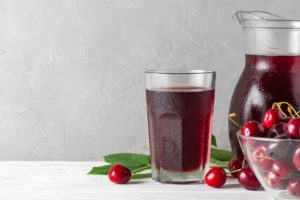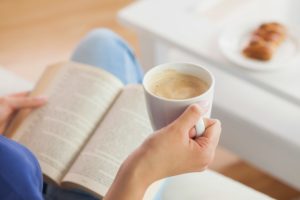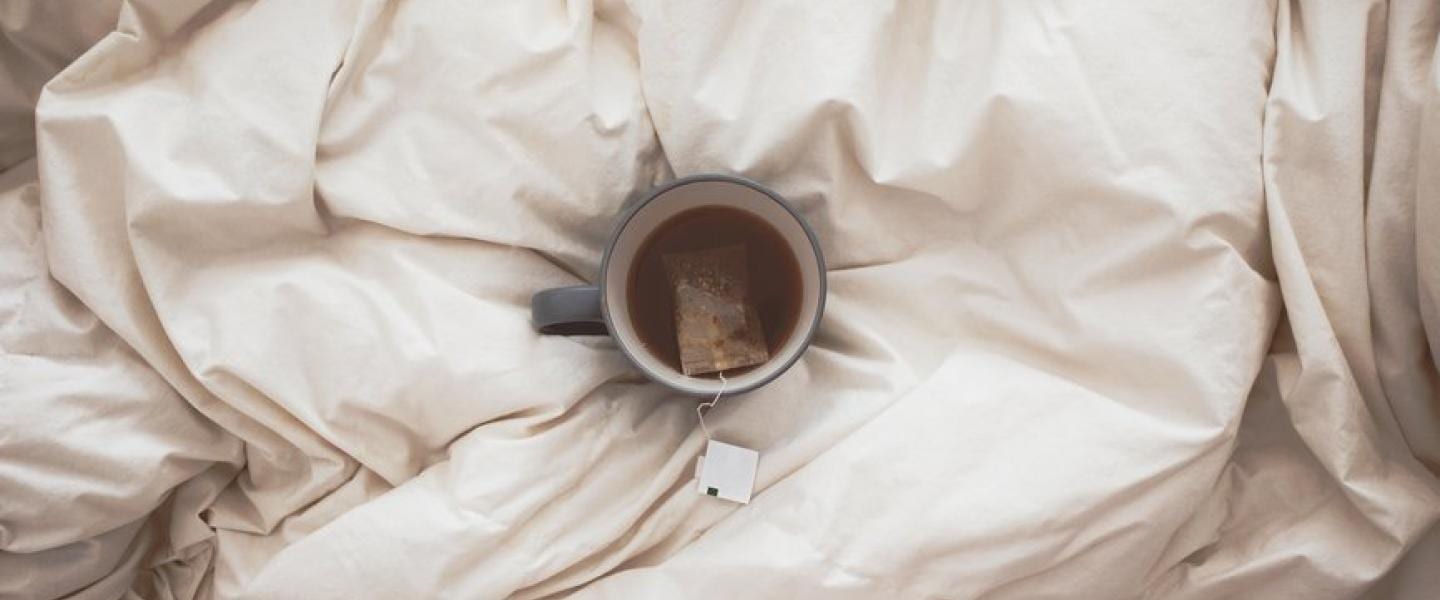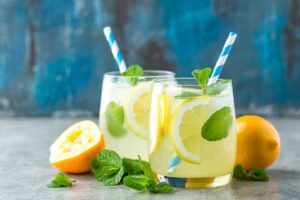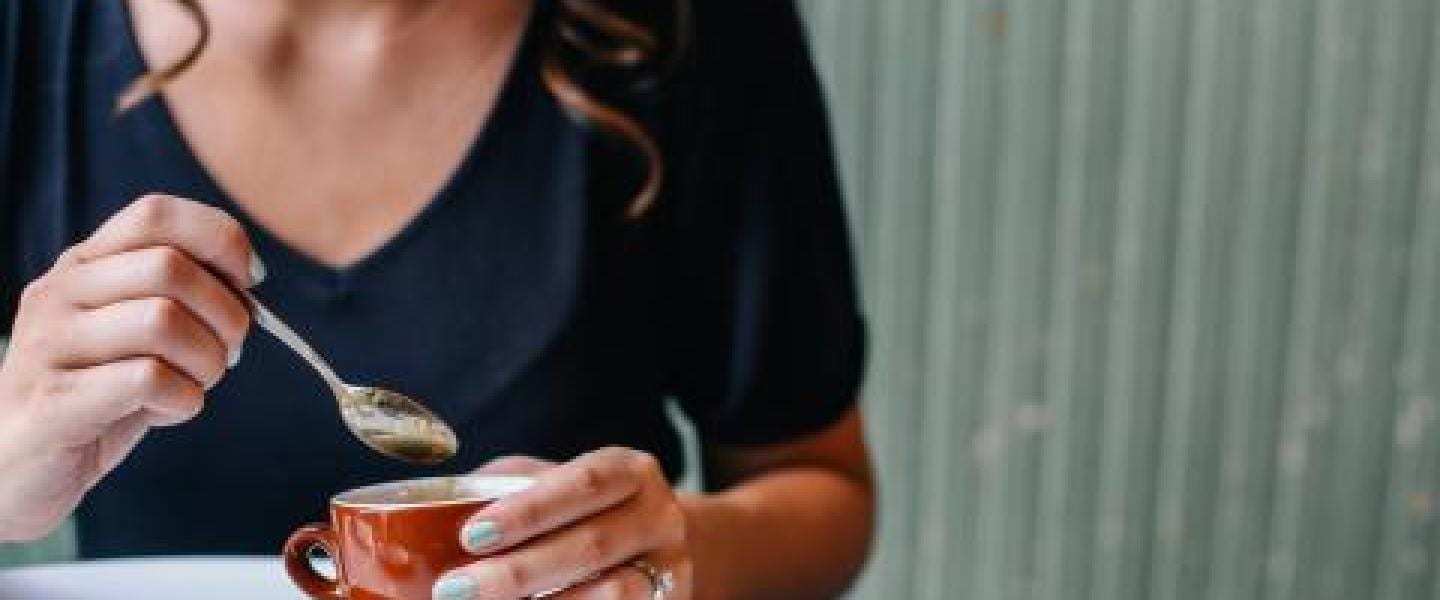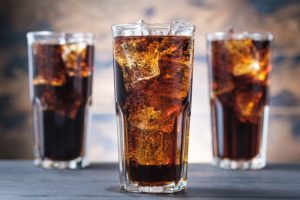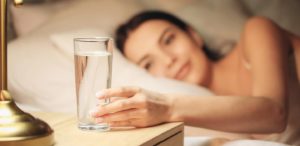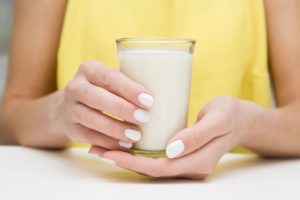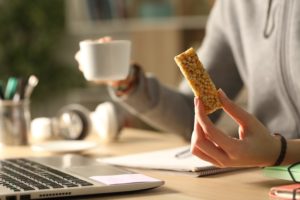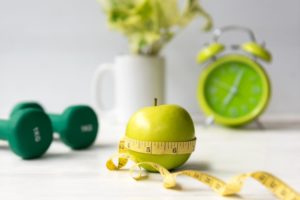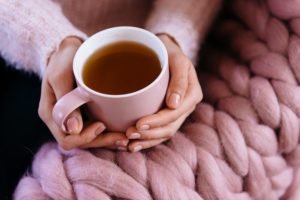When you buy through our links, we may earn a commission. Products or services may be offered by an affiliated entity. Learn more.
Drinking Water Before Bed
- Drinking water before bed helps prevent dehydration and supports temperature regulation.
- Be mindful of the amount to avoid nighttime bathroom trips and acid reflux.
- Moderation and timing can balance nighttime hydration with quality sleep.
Some people find that drinking a glass of water before bed helps them sleep, but for others, this habit may cause sleep issues. We explore the science behind hydration and sleep to help you decide what is best for you.
How Does Drinking Water Before Bed Impact Sleep?
Although our bodies are programmed to slow urine production during sleep, excessive fluid intake may push you past this threshold and cause nighttime bathroom trips that interfere with sleep. You are more likely to wake up to urinate if you are already sleeping poorly, for example due to stress or a sleep disorder. Going short on sleep also seems to contribute to dehydration, indicating the two processes are intricately connected.
Looking to improve your sleep? Try upgrading your mattress.
It is not uncommon to feel thirsty right before going to bed. In fact, a study in mice showed that the tendency to drink more in the evening might be a natural part of the sleep-wake cycle, in order to prevent becoming dehydrated overnight. Although mild dehydration does not appear to directly impact sleep for otherwise healthy people, staying hydrated supports systems in the body that do impact your sleep.
Benefits of Drinking Water Before Bed
Water is an essential nutrient for the human body, helping to remove waste, lubricate the joints, regulate body temperature, and cushion sensitive tissues. Although recommendations vary, the general consensus is that adults should drink between 2.5 and 4.5 liters of water a day depending on their body weight and level of activity. This can be in the form of plain water, or it can come through fruit, herbal teas, or other fluids.
Drinking water also helps prevent headaches and enables sweating to keep us cool. If you live in a warmer climate, then you are more likely to sweat during the night, which can eventually result in dehydration. Drinking water before bed might help ward off dehydration while you sleep, and it may also help you attain the drop in core body temperature that helps induce sleepiness.
There are certain other cases when it may be helpful to drink water before bed. For some, hot water may form part of a relaxing bedtime routine. If you have a cold or a flu, a glass of hot water might help relieve symptoms so you can get some rest. Breathing through your mouth causes you to lose more water than breathing through your nose, so people with nasal congestion might drink water to replenish the lost fluids.
Things to Consider About Drinking Water Before Bed
Despite the benefits of staying hydrated throughout the day, drinking water right before bed may cause sleep problems for some people.
Nocturia
Waking up in the middle of the night to urinate more than once is called nocturia. Nocturia can disrupt the sleep cycle, and as a result it has been linked to reduced productivity, falls and accidents, and depression. Drinking too much water before bed contributes to nocturia, especially for people with certain conditions such as kidney disease or diabetes, or those who are taking diuretic medicines. In some cases, nocturia or frequent urination at night may be a symptom of sleep apnea.
You can reduce the chances of nocturia by:
- Reducing fluid intake in the evening
- Avoiding alcohol, caffeine, and sugary drinks before sleep
- Asking your doctor if you can try taking your diuretic medications in the morning
Recording how much fluid you drink each night, including watery foods such as fruit, may help you identify connections between fluid intake and nighttime urination. If you still need nighttime bathroom visits after reducing the water you drink in the evening, talk to your doctor.
Bedwetting
As part of a multifaceted treatment plan, reducing fluid intake in the evening may help reduce episodes of bedwetting. Whether or not you experience bedwetting, it is a good idea to empty the bladder one last time right before going to sleep. However, bedwetting is typically a problem that affects kids more than adults.
Bottom Line
While there are benefits to drinking water before bed, it can be disruptive to your sleep, as it can lead to frequent nighttime wakings to urinate. If you feel very thirsty before bed, you may want to drink a small glass of water to help you get through the night. However, the ideal is to stay hydrated throughout the day so you do not need to drink excessive amounts of water at bedtime.
You may want to consider avoiding excessively salty, sweet, or spicy foods before bed so you do not feel too thirsty. It is particularly important to drink more water if you notice symptoms of dehydration such as thirst, dry mouth or skin, or dark urine.
Keep your bedroom at a comfortable temperature to prevent excessive sweating, and talk to your doctor if you have any concerns about nighttime urination or water intake. They may be able to identify and help you treat an underlying condition.

Still have questions? Ask our community!
Join our Sleep Care Community — a trusted hub of sleep health professionals, product specialists, and people just like you. Whether you need expert sleep advice for your insomnia or you’re searching for the perfect mattress, we’ve got you covered. Get personalized guidance from the experts who know sleep best.
References
16 Sources
-
A.D.A.M. Medical Encyclopedia. (2019, July 31). Urinating more at night. MedlinePlus.
https://medlineplus.gov/ency/article/003141.htm -
Rosinger, A. Y., Chang, A. M., Buxton, O. M., Li, J., Wu, S., & Gao, X. (2019). Short sleep duration is associated with inadequate hydration: Cross-cultural evidence from US and Chinese adults. Sleep, 42(2), 10.1093/sleep/zsy210.
https://pubmed.ncbi.nlm.nih.gov/30395316/ -
Gizowski, C., Zaelzer, C., & Bourque, C. W. (2016). Clock-driven vasopressin neurotransmission mediates anticipatory thirst prior to sleep. Nature, 537(7622), 685–688.
https://pubmed.ncbi.nlm.nih.gov/27680940/ -
Aristotelous, P., Aphamis, G., Sakkas, G. K., Andreou, E., Pantzaris, M., Kyprianou, T., Hadjigeorgiou, G. M., Manconi, M., & Giannaki, C. D. (2019). Effects of controlled dehydration on sleep quality and quantity: A polysomnographic study in healthy young adults. Journal of Sleep Research, 28(3), e12662
https://pubmed.ncbi.nlm.nih.gov/29411452/ -
Division of Nutrition, Physical Activity, and Obesity, National Center for Chronic Disease Prevention and Health Promotion. (2021, January 12). Water and healthier drinks. Centers for Disease Control and Prevention.
https://www.cdc.gov/healthy-weight-growth/water-healthy-drinks/index.html -
Armstrong, L. E., & Johnson, E. C. (2018). Water intake, water balance, and the elusive daily water requirement. Nutrients, 10(12), 1928.
https://pubmed.ncbi.nlm.nih.gov/30563134/ -
Sawka, M. N., Cheuvront, S. N., & Carter, R., 3rd (2005). Human water needs. Nutrition Reviews, 63(6 Pt 2), S30–S39.
https://pubmed.ncbi.nlm.nih.gov/16028570/ -
Spigt, M., Weerkamp, N., Troost, J., van Schayck, C. P., & Knottnerus, J. A. (2012). A randomized trial on the effects of regular water intake in patients with recurrent headaches. Family Practice, 29(4), 370–375.
https://pubmed.ncbi.nlm.nih.gov/22113647/ -
Kenefick R. W. (2018). Drinking strategies: Planned drinking versus drinking to thirst. Sports Medicine (Auckland, N.Z.), 48(Suppl 1), 31–37.
https://pubmed.ncbi.nlm.nih.gov/29368181/ -
Popkin, B. M., D’Anci, K. E., & Rosenberg, I. H. (2010). Water, hydration, and health. Nutrition Reviews, 68(8), 439–458.
https://pubmed.ncbi.nlm.nih.gov/20646222/ -
Kräuchi K. (2007). The thermophysiological cascade leading to sleep initiation in relation to phase of entrainment. Sleep medicine reviews, 11(6), 439–451.
https://pubmed.ncbi.nlm.nih.gov/17764994/ -
Sanu, A., & Eccles, R. (2008). The effects of a hot drink on nasal airflow and symptoms of common cold and flu. Rhinology, 46(4), 271–275.
https://pubmed.ncbi.nlm.nih.gov/19145994/ -
Svensson, S., Olin, A. C., & Hellgren, J. (2006). Increased net water loss by oral compared to nasal expiration in healthy subjects. Rhinology, 44(1), 74–77.
https://pubmed.ncbi.nlm.nih.gov/16550955/ -
Oelke, M., De Wachter, S., Drake, M. J., Giannantoni, A., Kirby, M., Orme, S., Rees, J., van Kerrebroeck, P., & Everaert, K. (2017). A practical approach to the management of nocturia. International Journal of Clinical Practice, 71(11), e13027.
https://pubmed.ncbi.nlm.nih.gov/28984060/ -
A.D.A.M. Medical Encyclopedia. (2020, January 1). Bedwetting. MedlinePlus.
https://medlineplus.gov/ency/patientinstructions/000703.htm -
MedlinePlus: National Library of Medicine (US). (2016, April 15). Dehydration.
https://medlineplus.gov/dehydration.html






